Which Traditions To Pick First in Stellaris
This post may contain affiliate links. If you buy something we may get a small commission at no extra cost to you. (Learn more).
Traditions represent the social and cultural evolution of your empire as it expands across the stars. They’re unlocked with unity and they will allow you to further customize your rising power during the game.
However, not all traditions are created equal:
While some are all-around great to have during the whole game and easy picks for a fledgling galactic empire, others are very situational.
In this guide, we will take a look at the most useful and versatile early game choices to select the best tradition order for your empire.
Quick TL;DR
- Discovery and/or Expansion for the early game
- Supremacy for early wars
- Harmony, Domination, Mercantile, or Prosperity for the economy
- Diplomacy for federation shenanigans
Tradition Trees (Quick Overview)
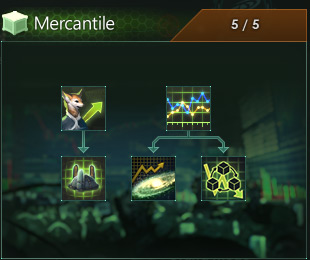
First of all, let’s look at how traditions are made and how much they cost. Here is the formula:
Tradition cost = [300 + (8 · Unlocked Traditions)¹⸱⁸] · (1 + 0.002 · Empire size cost)
They will grow more expensive as your empire expands & as you unlock more traditions during the game.
Traditions are organized in trees that must first be adopted. An empire receives a bonus when a tree is unlocked (which costs as much as unlocking a new Tradition) and when it is completed, along with an Ascension Perk.
Since finishing trees grants bonuses, and opening new ones increases the cost of all traditions, it’s generally advisable to complete the trees one at a time before moving on to the next.
There are thirteen different Tradition trees in the game, but only seven can be unlocked by any given empire. So you won’t be able to use them all in a single playthrough.
First Picks: Discovery and Expansion
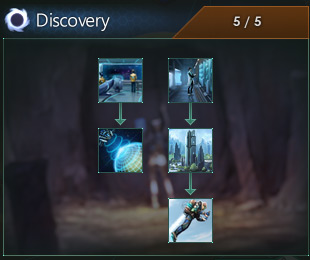
Stellaris is a 4X game. And the Discovery tree is (almost) all about the first “X”: Exploration.
So it should be no surprise that this would be one of the best first picks in the game.
Here are its traditions in the optimal pick order:
| Pick Order | Tradition Name | Benefits |
|---|---|---|
| 1 | Adoption Bonus |
|
| 2 | To Boldly Go |
|
| 3 | Science Division |
|
| 4 | Polytechnic Education |
|
| 5 | Faith in Science | -20% Researcher upkeep |
| 6 | Databank Uplinks |
|
| Free | Finishing Bonus |
|
The adoption bonus is key. The edict it unlocks grants increased anomaly discovery chance, which means that all the systems you scan will have more anomalies that can in turn become resources for your growing empire.
The second and third picks are also quite strong, allowing you to explore faster than other empires and to have more control over your early techs.
All others are more useful late in the game and can be delayed for a brief detour in the Expansion tree.
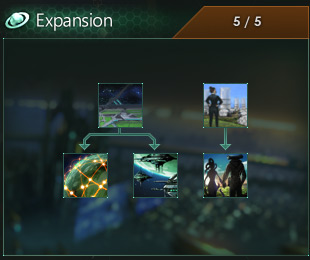
And now for Expansion, another “X” from this 4X masterpiece of a game.
First of all, here’s the tree in optimal pick order:
| Pick Order | Tradition Name | Benefits |
|---|---|---|
| 1 | Adoption Bonus | +25% Colony development speed |
| 2 | Colonization Fever | +1 Extra pops when establishing a colony |
| 3 | A New Life | +10% Pop growth speed |
| 4 | Reach for the Stars | -10% Starbase influence cost |
| 5 | Courier Network | -25% Empire size from Systems and Colonies |
| 6 | Galactic Ambition | -20% Starbase upkeep |
| Free | Finishing Bonus | +1 Max districts for all non-artificial planets |
The plan here is getting the strong bonuses from these amazing trees as soon as possible, even if opening the two of them early will cost us a large chunk of unity in the short term.
Here’s my ideal early game pick order:
- Discovery Adoption
- To Boldly Go
- Expansion Adoption
- Colonization Fever
- Science DIvision
- A New Life
This allows you to have the improved exploration in the very early game, and get more value from your guaranteed colonies.
At this point, finish Discovery, then Expansion, and you’re all set.
Note: This strategy works best for machine empires, lithoids, and anything with extra habitability.
Best Traditions For War
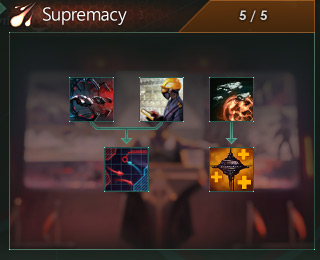
In Stellaris, your Pop total is king.
And the fastest method of obtaining new Pops is warfare.
It also has the advantage of taking away your enemy’s precious resources along with its colonies, so a military-themed tradition tree is a good choice. The two viable options are Supremacy and Unyielding,
The Supremacy tree is much better in general because we want to be on the offense, always on the prowl, always ready to claim more worlds. Let’s check it out:
| Pick Order | Tradition Name | Benefits |
|---|---|---|
| 1 | Adoption Bonus |
|
| 2 | Overwhelming Force |
|
| 3 | Master Shipwrights |
|
| 4 | Fleet Logistics Corps |
|
| 5 | War Games |
|
| 6 | The Great Game | +20% Damage to Starbases |
| Free | Finishing Bonus |
|
The first two picks in particular are great for improving our early game military and can be used early on for a rush against a standard AI.
However, this is not always viable, as we might find ourselves boxed in by advanced start AIs or even Fallen Empires.
In the early mid-game, Supremacy is an extremely powerful option that will allow us to claim a good chunk of a neighboring empire – or to ward off potential invaders with well-rounded military bonuses.
Tip: “The Great Game” becomes much more powerful if pitted against an opponent that heavily relies on bastions. In such a situation, consider it as your third pick within the tree.
Traditions For Strengthening Your Economy
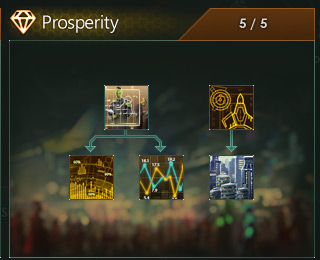
Several Tradition trees will end up boosting your economy by reducing various upkeeps, increasing productivity, or both.
| Traditions | Pros | Cons |
|---|---|---|
| Harmony |
|
|
| Domination |
|
|
| Mercantile |
|
|
| Prosperity | Great all-around bonuses | Nothing very impactful on its own |
There are many factors to consider here because we’ll realistically pick only one or two of these Traditions.
For instance, a non-expansionist empire will rarely find itself short on influence. So Domination will not be as useful.
Similarly, an empire not focused on trade will not gain as much from Mercantile.
But when in doubt, you can’t go wrong with Prosperity.
Mid-To-Late Game Tree: Diplomacy
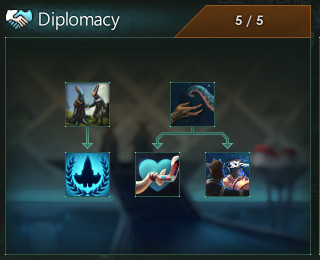
As the empires of the galaxy grow in power, you’ll have to find some friends or find yourself outgunned by large federations. And you’ll also want to influence the now well-established Galactic Community as much as possible.
The Diplomacy tree grants several options to increase your sway over the galaxy as a whole.
Here are its Traditions in optimal pick order:
| Pick Order | Tradition Name | Benefits |
|---|---|---|
| 1 | Adoption Bonus |
|
| 2 | The Federation |
|
| 3 | Entente Coordination | +100% Federation Naval Capacity Contribution |
| 4 | Diplomatic Networking | +3 Unity per Embassy |
| 5 | Direct Diplomacy |
|
| 6 | Eminent Diplomats |
|
| Free | Finishing Bonus |
|
Diplomacy is a very flexible tree.
Its usefulness will mostly vary based on your situation in the mid game.
If you’re striving to hold together a fragile defensive alliance, you should probably prioritize Diplomatic Networking and Direct DIplomacy instead of The Federation.
These bonuses can be used to establish grand ententes across the stars, to maintain a vast empire of subject fiefs with the Shared Destiny ascension perk, or to become Galactic Custodian (or Emperor) with the extra Diplomatic Weight and envoy.
In other words, other Tradition trees may have helped you assert your place in the galaxy, but Diplomacy will let you shape it.
Other Traditions Worth Looking Into
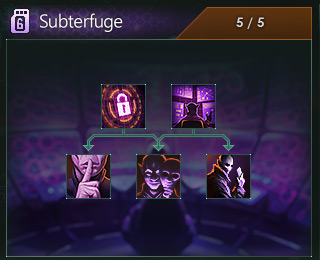
There are a few other Tradition trees, but in the late game you’ll probably have snowballed enough that it doesn’t matter anymore.
When you try peculiar or niche playstyles, however, these Tradition trees may find their time to shine – and to be honest, some of them are a lot of fun to play.
Just as an example, Unyielding is usually a weaker version of Supremacy.
Pacifist empires have very little use for Supremacy, and roleplaying an isolationist power and seeing fleets destroyed by my bastions is exhilarating – at least for me.






